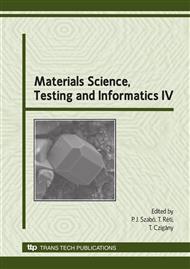p.239
p.245
p.251
p.257
p.263
p.269
p.275
p.281
p.287
The Examination of Weld Line Properties in Injection Molded PP Composites
Abstract:
This paper focuses on the effect of different fiber content on the mechanical properties of specimens with and without weld lines. The effect of three different melt temperatures and holding pressures were also investigated. For the experiments dumbbell shaped standard tensile specimens with and without weld lines were injection molded from PP (TVK’s H116F homopolymer) and short glass fiber (0, 10, 20, 30, 40 wt%). The mechanical properties of these composites were determined by quasi-static (standard tensile testing) and dynamic (Charpy impact test) testing methods and the corresponding weld line factors were calculated. The fracture surfaces were analyzed with the help of scanning electron microscopy (SEM). From the results of the tensile and Charpy-impact tests, it was ascertained that the temperatures and the holding pressures during injection molding did not affect the tensile and impact properties, but fiber length had a major impact on the mechanical properties of this specific composite. By increasing the fiber content, the tensile strength increased until a peak and declined after. Whereas the impact resistance decreased by the increasing fiber content in the whole examination window. Comparing the weld lined and weld line free specimens, it was concluded that weld lines did significantly decrease the tensile strength and impact properties due to the unfavorable fiber orientation beside the weld line which was visualized by scanning electron microscopy.
Info:
Periodical:
Pages:
263-267
DOI:
Citation:
Online since:
June 2008
Authors:
Price:
Сopyright:
© 2008 Trans Tech Publications Ltd. All Rights Reserved
Share:
Citation:


